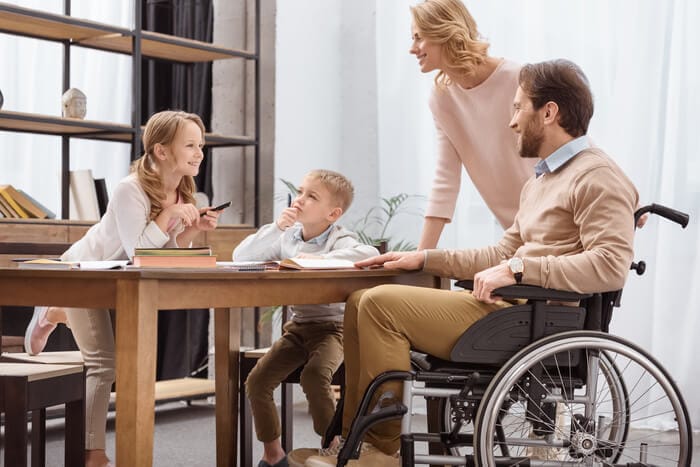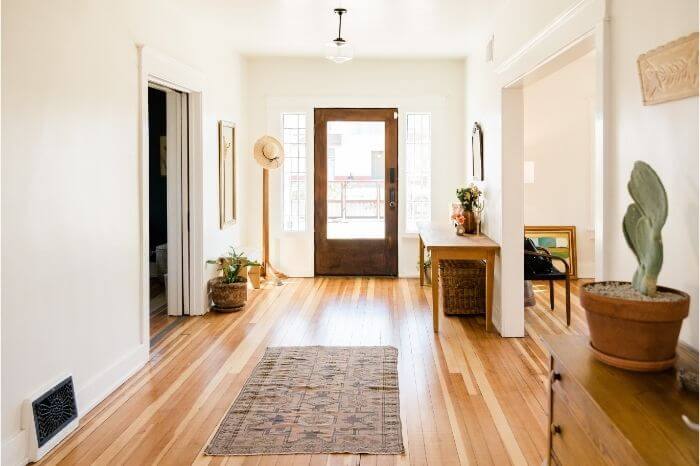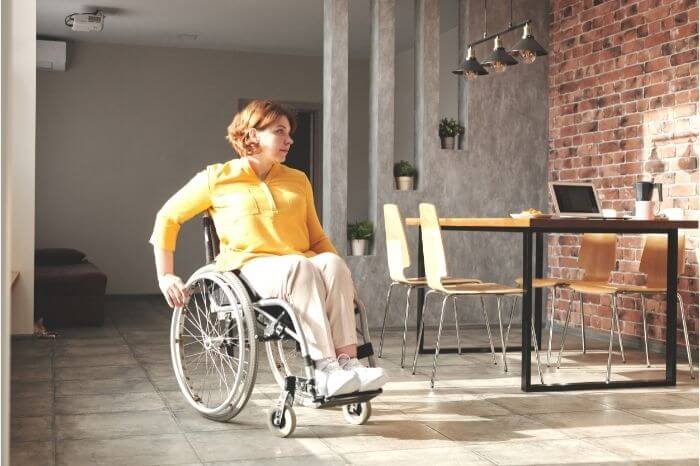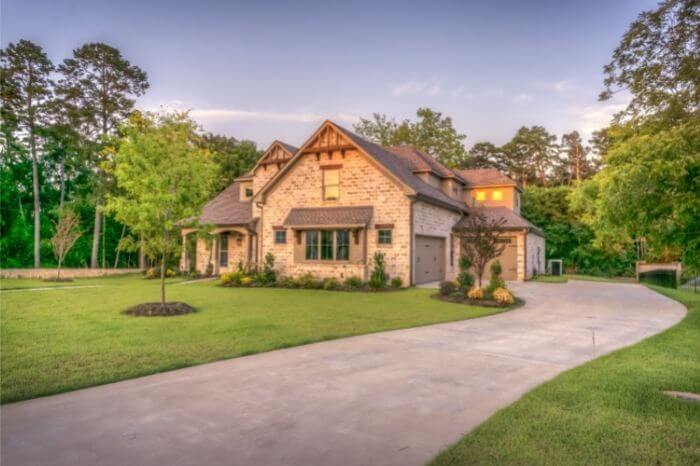Why You Should Offer Wheelchair Accessible Vacation Rentals

In recent years, vacation rental OTAs have put more emphasis on the accessibility of the properties advertised on their sites. As such, offering wheelchair-accessible vacation homes for guests who require them is a growing trend in the property management space.
According to statistics from the CDC, 61 million adults living in the United States have a disability. This is approximately every 1 in 4 adults, making it one of the largest minority groups of people. So, while it does not affect the majority of travelers, it is something that will make a lasting impression on travelers that need it.
Read on to find out more about what makes a vacation rental wheelchair accessible.
What Is A Wheelchair Accessible Vacation Rental?
A wheelchair-accessible vacation home is a short-term rental property that has been adapted to cater to wheelchair users. This typically includes home alterations like step-free access, wheelchair-friendly rooms, wide doorways and hallways, and other room-specific wheelchair access amenities, like a roll-in shower in the bathroom or an adjustable bed in the bedrooms.
These handicap-accessible amenities will make it easier for guests who rely on wheelchairs to get around their vacation rentals and enjoy their experience.

Why Should You Make Your Vacation Rental Wheelchair Accessible?
So, now that we have an idea of what accessible vacation homes entail, the next question to ask yourself is: Should you change your vacation rental to meet wheelchair accessibility requirements?
Let’s dive deeper into the pros and cons of making your vacation rental accessible to other wheelchair users.
Pros:
1. You will show up on accessibility filters and features
Leading online travel agencies like Airbnb and Vrbo allows users to search for short-term rentals for their next family vacation that specifically feature handicap accessibility. Travelers on the platforms can use filters to narrow down their search according to short-term rentals that offer the accessibility features they are looking for.
For example, Vrbo offers travelers the opportunity to narrow down their search to show rental properties that have:
- Wheelchair access
- An elevator
Meanwhile, Airbnb allows travelers to filter holiday stays by:
- Step-free entry
- Step-free access path to the guest entrance
- A guest entry that is wider than 32 inches
- Accessible parking spot availability
- Step-free access to the bedroom
- Bedroom entry that is wider than 32 inches
- Step-free access to the bathroom
- Bathroom entry that is wider than 32 inches
- Shower grab bars
- Toilet grab bars
- Roll-in shower
- Shower or bath chair
- Ceiling or mobile hoist.
2. You can meet the growing demand
The vacation rental industry is growing rapidly as travel restrictions ease and travelers are rushing to book summer vacation homes. While there may be ample homes to choose from across booking platforms, there is always a lower supply of rental properties with accessibility features.
By adapting your home to meet the demand for accessible vacation rentals, you can win over more bookings as you become a viable option for guests with a disability.
3. You will gain a competitive edge
Any opportunity where you can offer amenities that your competition does not is a step in the right direction.
By making your short-term rental wheelchair accessible, you will have a leg up on your competition which will increase bookings, boost revenue, and help you to scale your business faster.
Plus, lots of vacation rental travel sites and travel bloggers occasionally publish articles about the best wheelchair-accessible vacation rentals. Scoring a place on these lists means your business will benefit from free advertising and it will help to grow your popularity.
4. You can show you care and elevate your guest experience
If hosts do not consider whether guests with disabilities will be able to get around the house, it may leave guests feeling like their host does not care about their experience.
Adding amenities that could make your guests’ stay more comfortable will leave a lasting impression and is a sure-fire way to attract more glowing reviews.
Cons:
1. It can be costly to make renovations
If your vacation home does not have the accessibility features already, making the necessary renovations could leave a big hole in your pocket. Adding a roll-in shower, widening doorways, or building ramps for step-free access will all add up eventually.
It’s important to take into consideration where your house is located and the demand for wheelchair accessibility in your location. If nobody is inquiring about wheelchair access in your home yet, it may be a good idea to first make minor, affordable renovations first before spending large amounts of money.
2. You can’t accommodate every type of disability
Wheelchair access is not the only way to cater to guests with disabilities. Guests may have other disabilities that could also have special requirements when travelers choose to stay at your property. Therefore, it may be difficult to draw the line to determine what your home can accommodate and what it can’t.
So, if the pros outweigh the cons for your business, let’s take a closer look at how to make your property wheelchair accessible.
How To Make Your Vacation Rental Wheelchair Accessible
If you’ve decided to make your short-term rental wheelchair accessible, chances are you will need to make some changes around your home to meet the criteria.
While we share our insider tips below, it’s important to remember that every space is different, and it’s up to you to think creatively about the space you have to work with.
It helps to put yourself in the shoes of your guest. Think realistically about how they will enter your house, if they can access all areas, and if something might get in their way.
Here are some tips to offer accessible rooms and set up your short-term rental to accommodate guests using wheelchairs:
1. Accessible parking
For guests who are handling wheelchairs, parking can be one of the most bothersome issues. It is important to be clear in your property description whether you can offer parking on your premises or not so that your guest can plan ahead.
If you cannot offer parking on your property, the next best thing is to do research and find safe and secure places for your guest to park and mention this in your check-in instructions.
Wherever you instruct your guest to park — whether on the property or elsewhere — one of the most important considerations for travelers with wheelchairs is that they’ll need enough space on either side to park and get out of their vehicles via a ramp or lift. It’s also a good idea to keep the parking as close to the entrance of your home as possible.
2. Accessible entrance and doors
To ensure your guest has a pleasant and hassle-free welcome, it is crucial to make sure your entrance is easily accessible and the doorway is wide enough to allow a wheelchair to pass through.
If you have stairs leading to your front door, you will need to make other arrangements to allow access for a disabled guest. Ideally, this would be to install a ramp leading to the front door. But if this is not possible or too expensive to do, you could give your guest instructions to access your place through another door that does not have stairs, like through a back door.
For all the doors of your short-term rental, you need to ensure they are wide enough to allow a wheelchair to pass through. Most wheelchairs are around 25 inches wide, but it’s best to have your doorways a bit wider to allow for bigger wheelchairs and extra comfort room. To meet Airbnb’s requirements, the doorways will have to be a little wider than 32 inches at least.
If you can, moving the door handles lower on your doors will also go a long way in making a great impression on your guests.
3. Accessible hallways
While most modern hallways are generally wide enough to accommodate a wheelchair, it’s a smart idea just to double-check it meets the same requirements as your doors.
To ensure your hallways are accessible, it’s also important to keep them uncluttered. This means not having too much furniture or decor taking up space.

4. Accessible living room and dining room
The living room and dining room will most likely have the bulkiest furniture – sofas, tables, TVs, etc., so it’s important to think through how a guest with a wheelchair will move around in these spaces specifically. Make sure there is enough space in between furniture to move around, and don’t be scared to remove some furniture to make more room.
5. Accessible kitchen
When making your kitchen more accessible, the best advice to follow would be to put yourself in the shoes of your guest. Try to think about whether guests in wheelchairs will be able to reach all essential appliances and if the counters and cupboards are low enough for them to reach. If not, redoing your kitchen can get a bit pricey. So, the best thing to do would be to move all essential appliances within reach and perhaps add an additional low-rise table to the kitchen for your guest to use.
6. Accessible bathroom
Having at least one bathroom that’s fully accessible is arguably one of the most important rooms to get right in your vacation home. Your guest will need to be able to comfortably maneuver around the space and be able to use the bathroom easily in order to have a pleasant stay.
To make the bathroom accessible, you should consider adjusting your shower to make it a roll-in shower. You can also consider installing a shower chair. This will make it easier for disabled guests to use.
If you have a bathtub or hot tub, you should install handgrips for stability. Ensuring your surfaces are non-slip will be a meaningful extra touch too. As for the toilet, you could add grip bars for stability and easier movement.
7. Accessible bedrooms
Like the living room, the bedroom furniture can be a little bulky too. Create extra space by ensuring your bed is pushed up against a wall. This will enable better movement around the space. It’s also a good idea to have a low-rise bed, at least in one bedroom, to allow a guest in a wheelchair to shift to the bed easily.
8. Accessible second floor
If you have two or more floors, you’ll need to think through how guests are able to access the top floor, if at all.
Usually, only hotel rooms, apartments, or high-end accommodations might offer the luxury of an elevator to the top floor, but this is unrealistic for a typical family home. If the only way to access the second floor is via stairs, be sure to mention this in your property description.

How to Advertise That Your Vacation Rental is Wheelchair Accessible
Once your vacation rental is all set up to welcome wheelchair-using guests, it’s time to spread the word. Here are some tips to advertise your new amenities:
1. Update your listing on OTAs
The best part of updating your home to include accessibility features is that it means you can update your listing too!
As soon as your property is ready to accommodate disabled guests, you should update your listing to include these extra amenities. This will also allow your listing to start showing up on the accessibility filters for those searching for those extra features.
2. Add it to your direct booking website
The next best place to update your information is on your direct booking website. If you do not have your own website yet, a great time to do it would be after an upgrade to your property like this one.
While creating your own website might sound daunting at first, it’s not as scary as you may think. In fact, by signing up with iGMS, you can have your website ready to accept bookings in no more than five minutes.
By simply sharing your Airbnb listing with iGMS, the Website Builder feature is able to use your listing’s property description, images, pricing, availability, and more to create your stunning, personalized website.
iGMS software also provides all the tools you need to supercharge your business and automate daily hosting tasks, saving you time along the way.
In addition to creating a direct booking website, iGMS also enables you to:
- Manage multiple accounts and listings across the top booking platforms from a single interface
- Synchronize reservations across multiple platforms and your website to eliminate the risk of getting a double-booking
- Automate guest messaging and set triggers to reply to your guest instantly
- Track your business performance and growth on our analytics Dashboard
- Connect your Stripe account to iGMS to receive payouts and create invoices
- Automate guest review send-outs
- Share daily cleaning schedules and auto-assign cleaning tasks
- Manage direct bookings using a direct booking management toolkit
- Create essential reports on your performance and results within minutes
- Take advantage of smart pricing tools through integrations with PriceLabs, Beyond, DPGO, and Wheelhouse.
3. Post about it on your social media accounts

Social media is one of the best ways to maintain a personal connection with past and future guests. It provides the perfect platform for communicating any news about your business – like accessibility renovations.
Once you’ve made the updates to your property, snap a few high-quality photos and share them on your social media accounts to let your followers know about the great news.
Then, as word starts to spread about your new amenities, you’ll be able to reap the benefits of your investment as you watch your business grow to new heights.





![Your Monthly iGMS Roundup [February 2020]](/content/images/size/w600/wordpress/2020/02/igms-roundup-feb-2020-cover.png)

